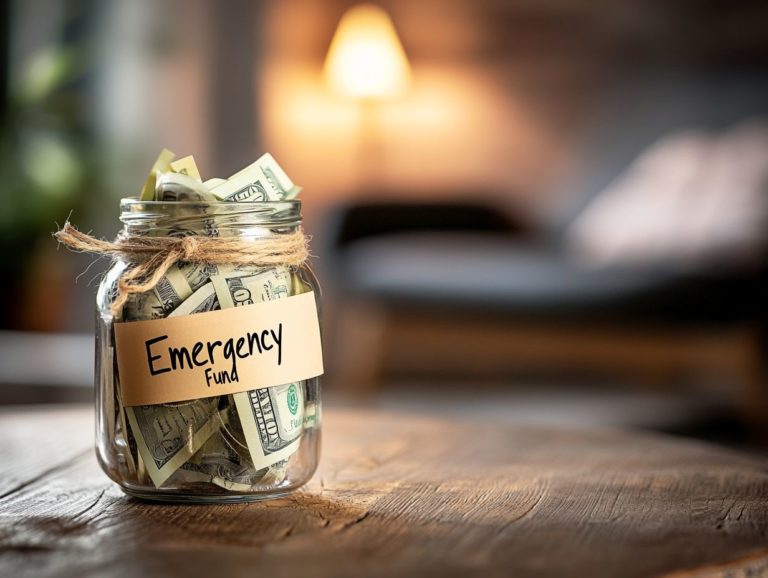How Can I Reduce My Monthly Expenses?
Managing your monthly expenses can feel overwhelming at times. However, with the right strategies, you can take charge of your finances.
This guide will empower you to understand your expenses. You ll learn to distinguish between essential and non-essential costs while tracking your spending effectively.
Craft a personalized budget that aligns with your financial goals. Explore practical methods to reduce costs and discover tips for staying committed to your budget.
Regularly reassessing your financial plan will keep you on the right path. Are you ready to reclaim your financial freedom? Let s dive in!
Contents
- Key Takeaways:
- Understanding Your Expenses
- Creating a Budget
- Practical Ways to Reduce Expenses
- Sticking to Your Budget
- Reassessing and Adjusting Your Budget
- Frequently Asked Questions
- Wondering how to cut down your monthly bills?
- Can I Reduce My Monthly Expenses Without Sacrificing My Quality of Life?
- How Can I Track My Expenses to Identify Areas to Cut Back On?
- What Are Some Long-Term Strategies for Reducing Monthly Expenses?
- What Are Some Common Mistakes to Avoid When Trying to Reduce Monthly Expenses?
- How Can I Stay Motivated to Continue Reducing My Monthly Expenses?
Key Takeaways:

- Identify essential and non-essential expenses to prioritize your spending.
- Create a budget and set financial goals to allocate funds for essential expenses.
- Lower utility bills, minimize food costs, and explore alternative transportation options.
Understanding Your Expenses
Grasping your expenses is crucial for effective money management. By identifying your income sources and categorizing spending, you can navigate your financial landscape better.
Recognize regular bills like mortgage payments and utility costs. Be aware of impulse purchases and lifestyle choices that can affect your budget.
The goal is to understand your financial habits. This awareness empowers you to achieve your savings objectives and maintain a balanced budget.
Identifying Essential and Non-Essential Expenses
Distinguishing between essential and non-essential expenses is a key step in crafting a sustainable budget. Essential expenses include necessary costs like utility bills, mortgage payments, and groceries.
Non-essential expenses cover discretionary spending like dining out and entertainment. These are items that can often be adjusted or eliminated.
By making this distinction, you can prioritize your financial resources effectively. This awareness allows you to allocate funds to necessities while setting limits on luxuries.
Tracking Your Spending
Tracking spending is essential for anyone aiming to elevate their money management skills. Use various methods, like budgeting apps or detailed spreadsheets, to streamline your financial process.
Each method has advantages: apps provide real-time insights, while spreadsheets allow for a customizable approach. A cash-only system can help sharpen your awareness of what you spend.
Consistent tracking reveals your spending habits and identifies areas for improvement. This ensures every dollar is directed toward your personal financial goals.
Creating a Budget
Creating a budget is a vital skill that empowers you to take control of your financial future. A well-structured budget enables you to allocate funds for essential expenses while reserving money for savings goals.
Categorize your income into different segments to manage regular bills effectively. This strategy helps you avoid debt and paves the way for a healthier financial life.
Setting Financial Goals

Setting financial goals is vital for your motivation and direction in budgeting. These goals act as a roadmap that helps you track progress and make smart financial choices.
Use the SMART framework to create clear goals. This means your objectives should be specific, measurable, achievable, relevant, and time-bound.
For instance, a short-term financial goal could be saving $1,000 for an emergency fund within six months. A long-term goal might be accumulating savings for a home down payment over the next five years.
Having clear objectives allows you to allocate resources effectively. This keeps you on track and fosters positive budgeting habits.
Allocating Funds for Essential Expenses
Allocating funds for essential expenses is crucial for your budget. It ensures that your basic needs are met before you spend on discretionary items.
Essential expenses typically include housing, utilities, groceries, transportation, and healthcare. These categories lay the groundwork for a stable financial situation.
It s wise to categorize these costs by priority. For example, your rent or mortgage should usually take the top spot, followed closely by utility bills and food expenses.
Keeping a meticulous record of these payments brings clarity to your financial picture. It also reveals areas where adjustments may be necessary, such as changes in income or unexpected costs.
By regularly reviewing and reallocating funds as needed, you can maintain a balanced budget that adapts to life’s unpredictable twists.
Identifying Areas to Cut Back On
Identifying areas to cut back is crucial for anyone aiming to improve their budget and elevate their financial habits.
Examine your spending patterns closely. You can uncover hidden costs that accumulate over time, like spontaneous purchases.
A savvy approach to avoid impulse buys is to create a detailed shopping list before heading out. This ensures you only bring home what you truly need.
Embracing home cooking not only fosters healthier eating habits but also cuts down on pricey takeout meals.
Utilizing subscription services thoughtfully can help you streamline monthly expenses. This allows you to enjoy valued content without unnecessary costs.
Practical Ways to Reduce Expenses
Practical methods for reducing expenses can enhance your financial stability. This enables you to achieve your savings goals with greater ease.
Focus on areas such as utility bills, food costs, and transportation options. This helps create a budget that addresses your essential needs while allowing for some discretionary spending.
Embrace strategies for energy efficiency. Planning meals to minimize grocery expenses and considering public transit can lead to impressive savings.
Lowering Utility Bills
Lowering your utility bills is a simple yet effective way to trim your monthly expenses and enhance your overall budget.
Implement some practical strategies to impact your energy usage and costs significantly. For example, investing in energy-efficient appliances reduces consumption and often comes with rebates or tax incentives.
Adjust your thermostat lower it in winter and raise it in summer to yield noticeable savings.
Cultivating energy-saving habits like turning off lights when leaving a room can also contribute to long-term savings.
Collectively, these steps foster a more sustainable lifestyle while boosting your financial health.
Minimizing Food Costs

Minimizing food costs can significantly impact your budget. This gives you the flexibility to allocate funds to other spending categories that matter to you.
By implementing a few effective strategies, you can save money while enhancing your overall dining experience. Meal planning is essential. It involves deciding in advance what meals to prepare, streamlining your grocery shopping and eliminating impulsive choices that often lead to overspending.
Pair this with home cooking. You not only use fresh ingredients but also reduce your reliance on pricier convenience foods. Crafting a detailed shopping list based on your meal plans keeps you on track with your budget, preventing unnecessary expenses and nurturing a healthier, more mindful relationship with food.
Exploring Alternative Transportation Options
Explore alternative transportation options to save money and refine your budget. Public transportation, carpooling, or biking can help you cut costs.
When you consider public transportation, you save on gas and parking fees while making a positive impact on the environment. Public transit systems, like buses and trains, provide an economical way to navigate urban landscapes and reduce your carbon footprint.
Carpooling allows you to share travel costs with friends or colleagues. This lightens your financial load and reduces the number of vehicles on the road. Biking not only saves you money but also promotes your physical health and overall well-being.
By embracing these alternative modes of transport, you enhance your financial savings and contribute to a more sustainable future for your community.
Sticking to Your Budget
Sticking to your budget is important for managing your money well and realizing your financial aspirations. However, many individuals struggle with the discipline required to stay on track.
Tips for Staying on Track
Staying on track with your budget demands discipline and consistent effort to meet your savings goals.
To enhance this process, implement monthly check-ins to assess your progress and adjust your spending habits as needed. Using budgeting apps can significantly simplify tracking your expenses, giving you a clear overview of your financial health.
It s also important to stay motivated. Find accountability partners who can encourage you and share similar aspirations. Collaborating with someone on your financial objectives allows you to celebrate successes together and offer support during challenging times. This ensures you remain focused and motivated on your journey toward financial freedom.
Reassessing and Adjusting Your Budget
Regularly reassessing and adjusting your budget is essential for navigating the fluctuations in your financial landscape. This proactive approach ensures you stay aligned with your savings goals and can adapt to changes.
Regularly Reviewing and Updating Your Budget

Regularly reviewing and updating your budget is crucial for effective money management and ensuring financial stability.
By closely monitoring your monthly expenses and categorizing them, you gain a clearer understanding of your spending habits. This practice uncovers areas where you might be overspending and allows you to make necessary adjustments to stay aligned with your long-term financial goals.
Being adaptable is equally important. Life can throw unexpected challenges your way, requiring a reevaluation of your priorities. Incorporating flexibility into your financial planning acts as a safety net during turbulent times, ensuring that your financial aspirations remain within reach.
Frequently Asked Questions
Wondering how to cut down your monthly bills?
You can cut your monthly expenses now! Here are several effective strategies:
- Cut back on unnecessary expenses, like dining out and subscription services.
- Create a budget and stick to it.
- Negotiate lower rates for services, such as internet or insurance.
- Combine debt to lower interest rates.
- Save on groceries by meal planning and using coupons.
- Consider downsizing your living space or finding cheaper housing options.
Can I Reduce My Monthly Expenses Without Sacrificing My Quality of Life?
Absolutely! You can reduce your monthly expenses while maintaining your quality of life. For tips on achieving this, check out the best way to cut unnecessary expenses. Here’s how:
- Find free or low-cost activities instead of pricey outings.
- Switch to affordable brands or stores for groceries and household items.
- Use public transport or carpool to save on car costs.
- Join loyalty programs or use rewards points to save money.
- Negotiate with service providers for better rates or packages.
- Shop around for better deals on insurance and other recurring expenses.
How Can I Track My Expenses to Identify Areas to Cut Back On?
Tracking your expenses is essential for identifying cutbacks. Try these methods:
- Keep a daily or weekly record of all your expenses.
- Use a budgeting app or spreadsheet to categorize expenses.
- Review bank and credit card statements for recurring charges.
- Calculate total spending and compare it to your income.
- Identify areas to change, like dining out or entertainment.
- Set specific goals for reducing expenses in certain categories.
What Are Some Long-Term Strategies for Reducing Monthly Expenses?
In addition to immediate changes, consider these long-term strategies:
- Pay off high-interest debt to save on interest charges.
- Reduce energy usage to cut down on utility bills.
- Invest in energy-efficient appliances and home improvements.
- Create an emergency fund to avoid credit reliance during unexpected expenses.
- Continuously review and adjust your budget for improvement.
- Invest in your education or professional development to boost your earning potential.
What Are Some Common Mistakes to Avoid When Trying to Reduce Monthly Expenses?
Avoid these common pitfalls while trying to reduce monthly expenses:
- Not creating a realistic budget or failing to stick to it.
- Making impulse purchases or neglecting to track small expenses.
- Not negotiating with service providers for lower rates.
- Continuing to spend on unnecessary habits or luxuries.
- Not setting specific goals or timelines for reducing expenses.
- Overlooking the long-term impact of small expenses or recurring payments.
How Can I Stay Motivated to Continue Reducing My Monthly Expenses?
Staying motivated is key. Here are some tips:
- Set small, achievable goals and celebrate your successes.
- Find an accountability partner or join a support group.
- Track your progress and regularly review your budget and spending.
- Reward yourself with small treats when you reach milestones.
- Continuously remind yourself of your end goal and its importance.
- Educate yourself on money-saving strategies and tips.
Start today, and watch your savings grow! Share your experiences or tips on reducing expenses, and let s foster a community of support.






